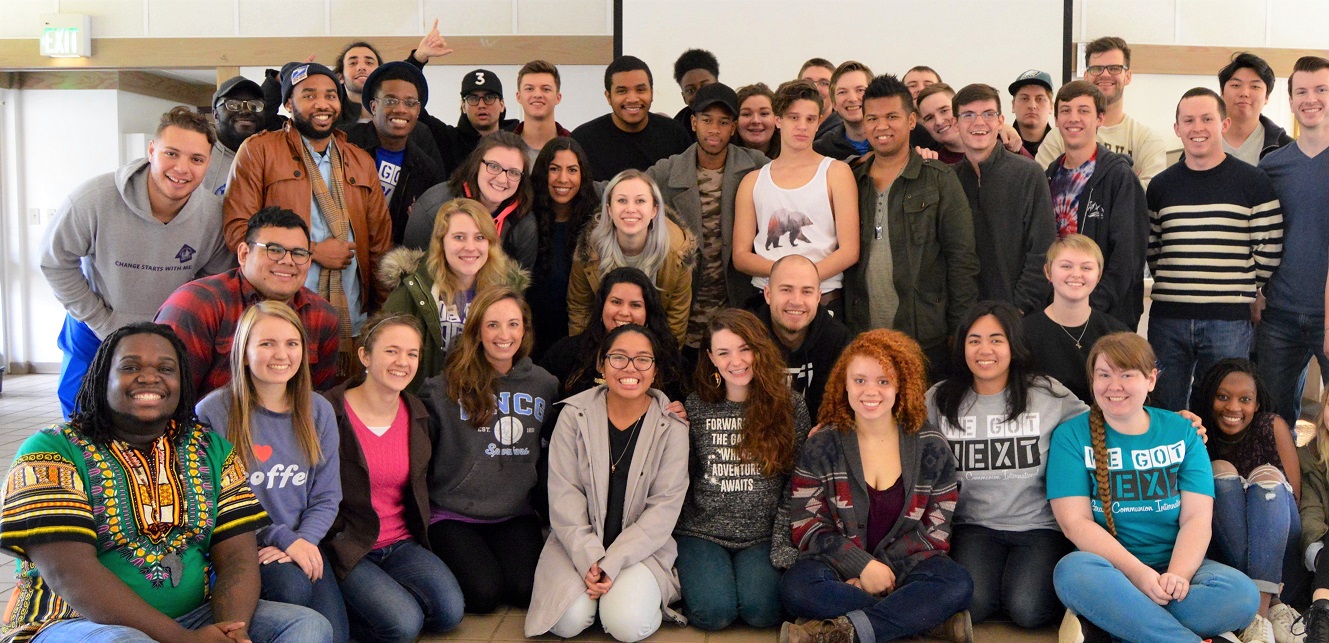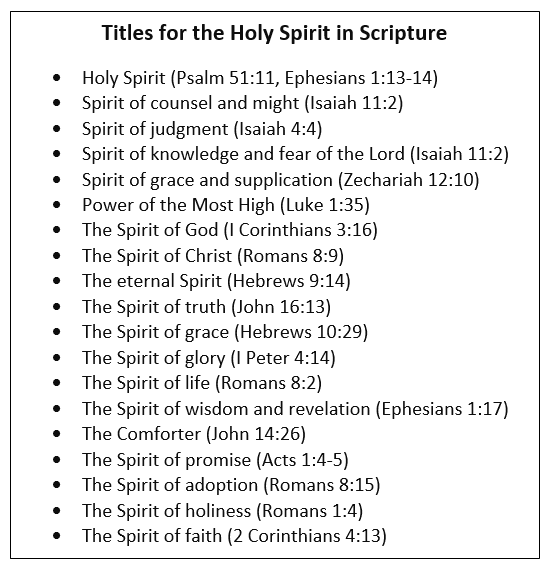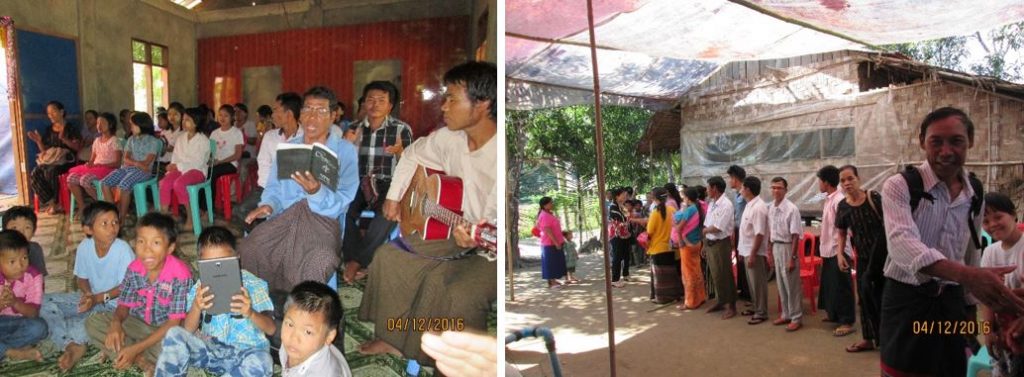We are blessed in GCI to have many pastors who have served in one location for many years. There are many advantages to a long tenure in one location, but how does a pastor stay inspired over a long period of time? For some helpful tips from Loren Hicks, click here.
Author: GCI Media
GC Next gathering

A group of young adults (pictured below) gathered recently for GC Next 2017. Here is a report from event coordinator Andy Rooney (and click on the picture below for video highlights).
Thanks to the Holy Spirit working through the prayers, support, guidance and encouragement of so many in GCI, GC Next was a tremendous success! 61 young adults (ages 18-30) from 16 different states (in the US and Canada), and 43 different churches came together at a retreat center near Durham, North Carolina, on MLK weekend (January 13-16) to worship, fellowship, sharpen ministry tools, and encourage one another towards fullness of life, love and community in Jesus Christ.

GC Next was unique in the sense that there was little delineation between leaders and participants. This was possible because the leadership team intentionally sought to proactively empower and facilitate. We offered 24 different workshops and had 23 different workshop leaders. Put another way, 43% of the participants at GC Next led a workshop! In addition, 31 different people (58% of participants) had some sort of leadership role in the planning and/or executing of the weekend. GC Next was a weekend of passion, sharing and collaborative learning. It was a picture of the Body of Christ utilizing its diverse gifting to function in unity with one another.
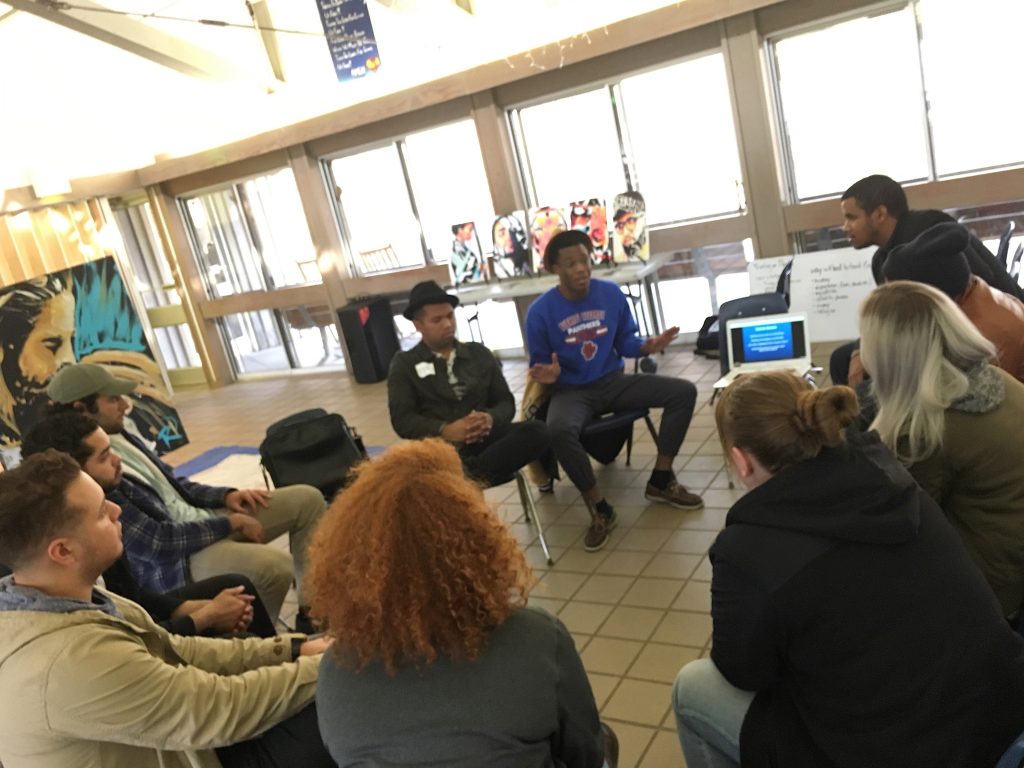
Our workshops were small group (12-15 people) discussions with interaction focused on themes of putting our theology into practice. We discovered indestructible peace, shared our testimonies, discussed sexual wholeness, served people at a nearby homeless shelter, practiced spiritual formation, developed tools to love others well, brainstormed ideas for sustainable ministries and much more. In addition, we had a night for games and fellowship, a night for dancing and celebration, and a night for prayer and worship (shout out to Revolution Cry for an incredible job leading us in worship!). It was a wonderfully enriching weekend where strangers left as family and young adults left inspired. God is certainly working in this next generation of GCI leaders!

Here are quotes from GC Next participants:
- “GC Next changed my life. I feel uplifted and encouraged to live life better.”
- “This past weekend was AMAZING. It was one of the best weekends ever. Bringing all those people together was absolutely magical. It made so many people so happy.”
- “I felt loved, accepted, and deeply challenged by people I just met.”
- “Very informative, eye-opening, and practical discussion.”
- “GC Next gives me hope. We can do a lot of good with this group.”
What Jesus says about the Holy Spirit
Dear Brothers and Sisters,

I sometimes talk with believers who struggle to understand how the Holy Spirit, like the Father and the Son, is divine—one of the three Persons of the Trinity. I typically offer them examples of how, in Scripture, the things said about the Father and the Son, which assume they are personal, are also said about the Holy Spirit. I then note the many titles ascribed in the Bible to the Holy Spirit (see the list below). Lastly, I share some of what Jesus taught concerning the Spirit. In this letter, I’ll focus on that teaching.
In the Gospel of John, Jesus refers to the Holy Spirit in three ways: Holy Spirit, Spirit of Truth and Paraklētos (a Greek word translated Advocate in the NIV, Counselor in the RSV, Helper in the ESV and Comforter in the ASV). Scripture shows that Jesus did not view the Spirit as a mere reservoir of power. The word paraklētos, which means “one called to the side of,” is commonly used in Greek literature to refer to a person who takes up the cause of another and defends them. In John’s writings, Jesus refers to himself as a paraklētos, then refers to the Holy Spirit using the same term.
On the evening before his crucifixion, Jesus told his disciples that he was going away (John 13:33), though he promised not to leave them “as orphans” (John 14:18). Instead, he promised to ask the Father to send “another Comforter [Paraklētos]” to be with them (John 14:16, ASV). By saying “another,” Jesus was indicating that there was a first (himself), and that the one to come, like himself, would be a divine Person of the Trinity, not just a power. Jesus had been serving as their Paraklētos—in his presence (even in the midst of terrible storms), the disciples found the courage and strength to go outside their “comfort zones” to participate with Jesus in the ministry he was doing on behalf of all humanity. But now Jesus was going to leave and they were, understandably, deeply disturbed.
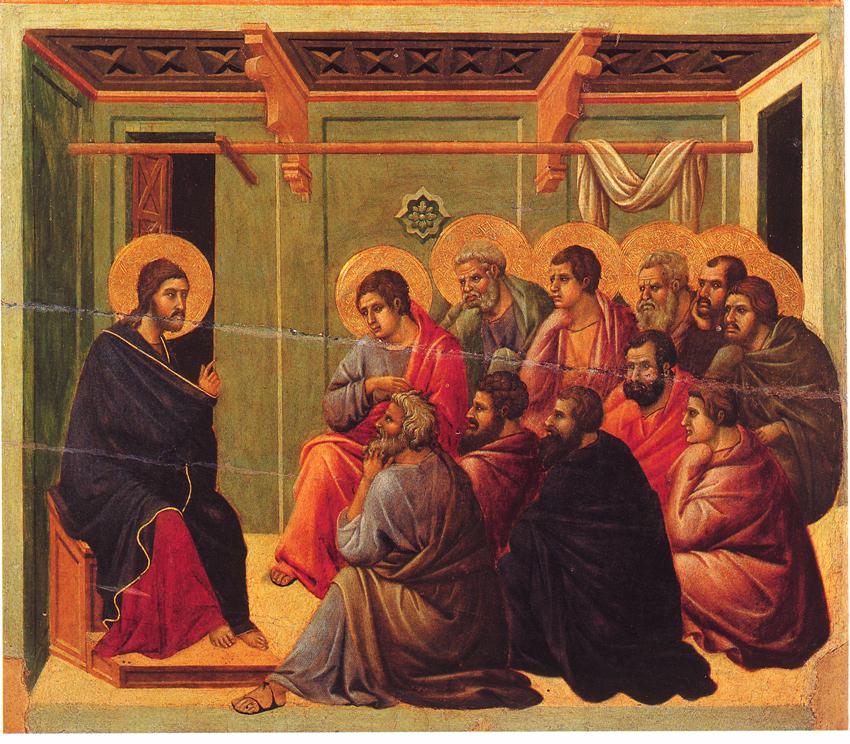
(public domain via Wikimedia Commons)
Up to that time, Jesus had been the disciples’ Paraklētos (note 1 John 2:1, where Jesus is called “an Advocate” [Paraklētos]). But now (particularly post-Pentecost), the Holy Spirit would be that Advocate—their ever-present counselor, comforter, helper and teacher. What Jesus promised his disciples, and what the Father sent, was not a mere power, but a Person—the third Person of the Trinity, whose ministry is to lead and guide the disciples in the way of Jesus.
We find the Holy Spirit operating in personal ways throughout the Bible: in Genesis, he hovers over the waters; in Luke’s Gospel, he overshadows Mary. He is mentioned 56 times in the four Gospels, 57 times in Acts, and 112 times in Paul’s epistles. In these references we find the Spirit, in distinctly personal ways, comforting, teaching, guiding, warning, determining and distributing gifts, interceding for us when we don’t know what to pray, assuring us of our adoption, and freeing us to call out to God as our Abba (Father) just as Jesus did. Note Jesus’ instruction:
When he, the Spirit of truth, comes, he will guide you into all the truth. He will not speak on his own; he will speak only what he hears, and he will tell you what is yet to come. He will glorify me because it is from me that he will receive what he will make known to you. All that belongs to the Father is mine. That is why I said the Spirit will receive from me what he will make known to you. (John 16:13-15)
In communion with the Father and the Son, the Holy Spirit has a distinctive ministry. Instead of speaking about himself, he points people to Jesus who then takes them to the Father. Instead of doing what he wills, the Holy Spirit implements the Father’s will in accordance with what the Son declares. The divine will of the one, united, triune God is thus expressed by the actions of the Father, through the Word (Jesus), performed by the Holy Spirit. We now can enjoy and benefit from the personal presence of God ministering among us by the Holy Spirit, our Paraklētos. United in being, act, will and purpose, yet distinct in three divine Persons, we worship and adore the Trinity.
Thankful for the Holy Spirit and his ministry,
Joseph Tkach
Need a theology adjustment?
Dear Brothers and Sisters,

It’s common to hear people complaining that theologians use long, complex sentences full of esoteric terms to address matters that seem irrelevant to everyday life. Perhaps you’ve felt that way at times, but have you considered that all of us are theologians of a sort? We all have opinions about God—whether he exists or not, and if he does, whether he is actively involved with his creation or is uninvolved, watching us (as the song made popular by Bette Midler declares), from a distance. This song, written by Julie Gold, does not claim that God is uninvolved with his creation, but that the troubles we sometimes face in life look less overwhelming from the “distance” of God’s perspective. Given that God’s view of things is often quite different than our own, it seems we all are in need of a theology adjustment.
The all-important question: Who is God?
In GCI, our theology adjustment came about (and continues), in part, through the writings of theologians who carefully conform their reasoning to God’s self-revelation in Jesus, the Living Word of God, communicated to us by the Holy Spirit through the Bible, the written Word of God. These theologians begin with the all-important question, Who is God?, which leads to asking Who is the God revealed in Jesus?, then Who are we in relation to God, in Christ? These questions, rather than being irrelevant, are fundamental to all aspects of life, including faith and morals.
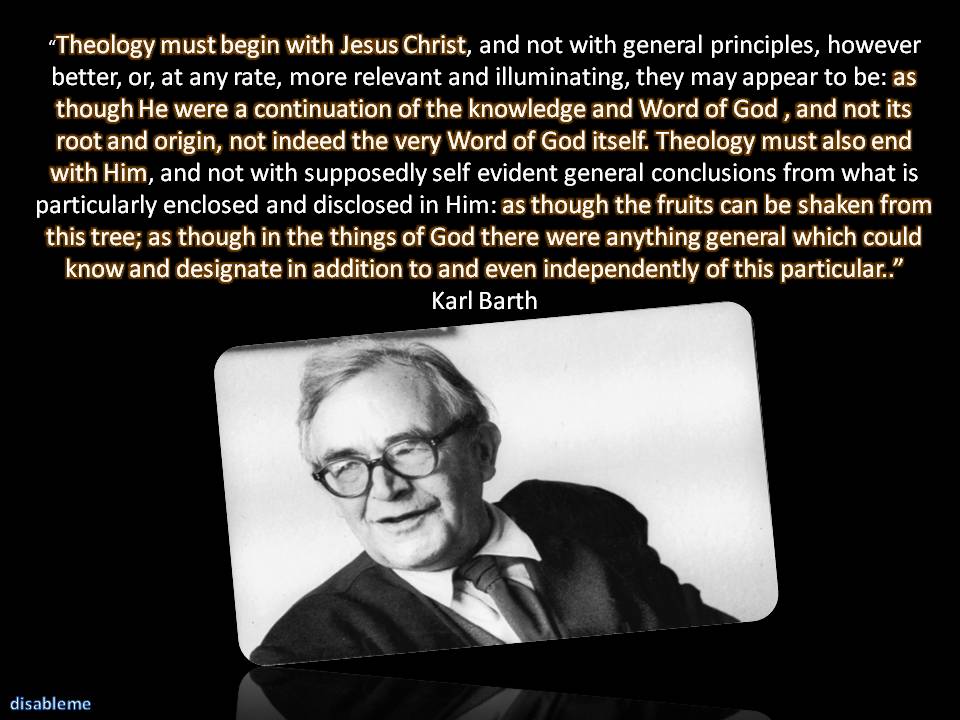
Broadly speaking, theologians study God and his relation to the world. Accurate theology begins with inquiring about the nature or character of this God who is revealed by Jesus to be the tri-personal, relational being who created humanity (male and female) to image God as relational beings. No matter our level of theological expertise and training, when we read the Bible based on this foundational understanding, we avoid many common errors in biblical interpretation. Reading Scripture on any other basis is like trying to make orange juice by squeezing the tree instead of the fruit!
Let me give you an example of this error. One of the most well-known verses in the Bible is John 3:16: “For God so loved the world that he gave his one and only Son, that whoever believes shall not perish but have eternal life.” To understand the fullness of this scripture, we must begin by asking Who?—who is this God who loves the world so much? Our knowledge of who he is, what he has done and said, and what he wants for us is essential for us to enjoy being in a relationship with him—one that affects every part of our lives.
In his first epistle, the apostle John declares that “God is love” (1 John 4:8, 16). Thus we understand that in sending his Son to save us, God was acting out of his nature. God, as love, is the one who loves—an understanding that contradicts the wrong views of God held by many, that in turn, lead to wrong views concerning how we are to love, live, work, play, marry, parent, purchase and worship. Our view of God affects all of life! That’s why we all need to aspire to be good theologians. And so I ask, do we need a theology adjustment?
A theological adjustment on the battlefield

T.F. Torrance often told of his service as a military chaplain in the British army during World War II. On one occasion he came across a young soldier on the battlefield who was mortally wounded. Looking up at Torrance, knowing he was about to die (and thus about to meet God), he asked, “Padre, is God really like Jesus?” Torrance assured him by saying, “He is the only God that there is, the God who has come to us in Jesus, shown his face to us, and poured out his love to us as our Savior.” Torrance then prayed for the young man as he took his last breath. That was not the first or the last time Torrance was asked the same question, and he welcomed it, though he was troubled when it was being asked by Christians who did not seem to know who God truly is.
T.F. focused much of his teaching on the communion God established with humankind in Christ, a communion that takes place in time and space. Torrance, along with other Trinitarian theologians, was careful to point out that Jesus came to reveal God as a tri-personal, loving, relational being who desires relationship with us. Jesus then commissioned his church to proclaim the good news that in Christ, through the Spirit, we have access to God our Father. As the world’s Savior, redeemer and reconciler, Jesus is the One through whom we enter communion with the Father, Son and Spirit, and through whom we receive eternal life. This gospel is the sole foundation for all good theology for it is what Jesus taught and exemplified. It is also the message the apostles taught the early church and the message we teach.
Living in Jesus’ story
By shaping and enhancing our faith, good theology helps us live in the middle of Jesus’ story, which, in turn, leads to good practices grounded in the reality of who God is and what he is doing throughout the universe. The universe is being reshaped by the first coming of Jesus, and will continue being reshaped until he returns. There is no other centerpiece to Christianity than Jesus—no commandment, no day of the week, no secret code, nothing but the life, death, resurrection, ascension and promised return of Jesus. Apart from all physical creation, Jesus has opened a new chapter of life for all humanity—a new chapter that all who respond to his calling may experience. Note C.S. Lewis’ comment:
The New Testament writers speak as if Christ’s achievement in rising from the dead was the first event of its kind in the whole history of the universe. He is the “first fruits,” the “pioneer of life.” He has forced open a door that has been locked since the death of the first man. He has met, fought, and beaten the King of Death. Everything is different because he has done so. This is the beginning of the New Creation: a new chapter in cosmic history has opened. (Miracles, p. 237)
Rejoicing in life’s new chapter,
Joseph Tkach
Responding to the refugee crisis

How shall we respond as congregations to the current refugee crisis in the United States (and elsewhere in the world)? This is a complex crisis fraught with controversy, and so caution (including non-partisan reserve) is in order. However, it is our conviction that the gospel certainly speaks directly to this issue.
Galen Carey, vice president of government relations for the National Association of Evangelicals (NAE) was one of seven panelists at a recent briefing for members of the U.S. House of Representatives on refugee resettlement. His helpful, biblically-reasoned and thus instructive remarks are found at https://www.nae.net/responding-current-refugee-crisis/.
Note: GCI in the United States is a member denomination of the NAE.
Good news from Myanmar
As noted in the report below from GCI mission developer Rod Matthews, last year GCI more than doubled its number of churches and members in the Southeast Asia nation of Myanmar (formerly Burma). This was the result of a group of congregations led by Pastor Chan Thleng seeking and being granted membership in our fellowship.

Chan Thleng had previously met with Wong Mein Kong, Southeast Asia Senior Pastor, on his several visits to Myanmar in response to this request to become part of GCI. Chan Thleng was the leading pastor in a group of congregations mostly based in the Chin Hills area in northwest Myanmar around the town of Matupi. He had also established a home congregation in Hmawbi, near the capital of Yangon in the south of the country. Chan Thleng had seen our website, read our literature and was delighted with the refreshing and genuinely good news revealed by and in Jesus Christ.
During past meetings, they had discussed our theology and pastoral approach, and as he came to know us better, his enthusiasm about bringing this group into our fellowship grew. However, he had to have some lengthy discussions with the pastors of his northern congregations to ensure that they all understood and agreed with the theology and the proposal to become GCI congregations. Last year Chan Thleng made a trip to Matupi and at the end of a conference of the elders there, they unanimously endorsed the proposal to become GCI congregations.
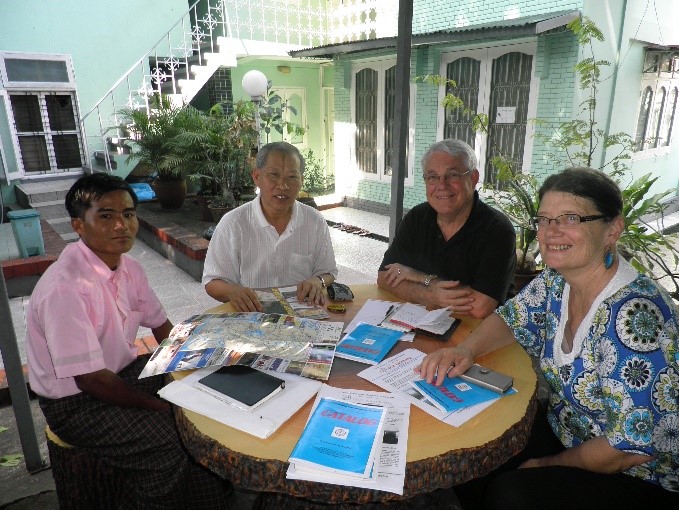 Last December, Ruth and I travelled with Wong Mein Kong and his wife, Chew Yeng, to Yangon, Myanmar to meet with Pastor Chan Thleng and visit his Hmawbi congregation. We first met at our lodging (see picture at right) where we discussed a wide range of topics related to our future together. We also planned the upcoming services in Hmawbi. What a great day it was!
Last December, Ruth and I travelled with Wong Mein Kong and his wife, Chew Yeng, to Yangon, Myanmar to meet with Pastor Chan Thleng and visit his Hmawbi congregation. We first met at our lodging (see picture at right) where we discussed a wide range of topics related to our future together. We also planned the upcoming services in Hmawbi. What a great day it was!
After a 40-minute car trip out of Yangon, on roads getting progressively narrower (see pictures below, top row), we were welcomed to the Hmawbi church compound by nearly 70 men, women and children (see pictures below, bottom row). As per their custom, we were presented with leis of flowers and escorted into the church building.
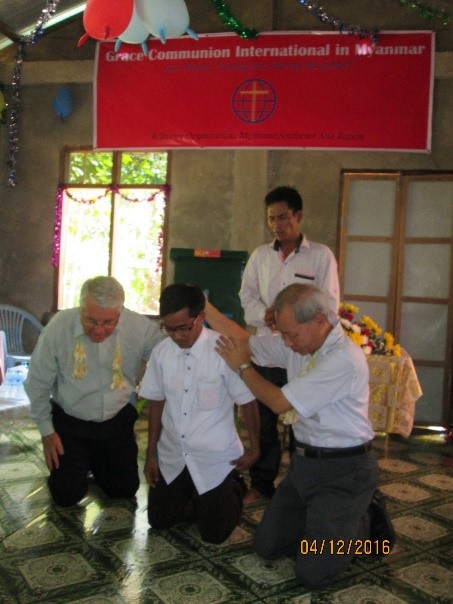 We joined the enthusiastic worship accompanied by a single guitar, and savored the warm welcome and community spirit. Most of the people are of Chin descent and speak only a Chin dialect or Burmese, and little English. Both Mein Kong and I gave messages translated for the audience. Next I rehearsed a little of the process that had led to this celebration and then, in front of the congregation and elders, prayed over Chan Thleng confirming his leadership as an elder in GCI and acknowledging him as our designated coordinating pastor for this group of congregations now part of our fellowship (see picture at right). The ladies’ group sang in celebration and the children presented two songs to everyone’s delight.
We joined the enthusiastic worship accompanied by a single guitar, and savored the warm welcome and community spirit. Most of the people are of Chin descent and speak only a Chin dialect or Burmese, and little English. Both Mein Kong and I gave messages translated for the audience. Next I rehearsed a little of the process that had led to this celebration and then, in front of the congregation and elders, prayed over Chan Thleng confirming his leadership as an elder in GCI and acknowledging him as our designated coordinating pastor for this group of congregations now part of our fellowship (see picture at right). The ladies’ group sang in celebration and the children presented two songs to everyone’s delight.
After the service, a community meal was served to the entire congregation, having been prepared over open fires on the property (see picture below). Chan Thleng lives in a small one-room house next to the church building; and not far away is a piece of land that the church has leased to grow lotus flowers to sell as a means of supplementing local income to support the church.
In addition to the Hmawbi congregation, there are another six in the Chin Hills, and one in Rakhine state, each with its own pastoral elder or leader, and with a combined attendance of over 300. Before we departed the Hmawbi church, Chan Thleng mentioned that it was his earnest desire to conduct a conference of elders in Matupi in March so all the elders in the group of congregations in the north could meet and hear from Wong Mein Kong and myself. Chan Thleng later, after a trip to Matupi, confirmed that the conference will be held there on March 24-25.
Getting to Matupi will be quite a trip for us needing a flight to Yangon, another flight or bus trip to Mandalay, and then a more difficult bus trip on rural roads into the high country in the west of Myanmar where Matupi is located. We are looking forward to meeting all these people who have been led to become part of GCI.
In a recent message, Chan Thleng reported on his trip to Matupi:
By God’s grace, and with one elder, I started our trip on Feb 10 and arrived safely on the 11th. We stayed two days in Matupi, visited church members’ homes and prayed for them and had worship services on two nights. We then visited six villages in the area [see pictures of the area below], holding worship services at night in which we told about GCI’s motto, vision, doctrines, ministries and Trinitarian theology. These people are interested in GCI and were blessed through our sharing. They love the meaning of grace, which some of them had never heard about before. God blessed this sharing of the gospel. One family joined GCI.
Concerning the planned conference in Matupi, Chan Thleng wrote this:
The topic for the conference will be GCI’s motto: Living and Sharing the Gospel. We plan to discuss about our planning for 2017—how to improve the work of the Lord spiritually and physically from now into the future. We will share our views and experiences, learning more about one another and the difficulties, failures, and successes we encounter.
We were surprised during our visit when Chan Thleng announced his plans to marry a young woman named Lydia, daughter of our elder in the town of Paletwa. We’ll have much to celebrate in March!

Myanmar has great potential for the expansion of GCI’s gospel work in Southeast Asia. We’ve been contacted by many small ministries and several Christian leaders running Bible Schools in Myanmar, including one in Mandalay where Mein Kong and I were invited to teach on this last trip. We’ve developed close friendships with several pastors who look forward to Mein Kong’s upcoming visits to that nation.
 We have a particularly close relationship with a young man who lives in the China Hills area named Van Thawm Lian (pictured at right with his wife Priscilla and daughter Junia). With financial support from GCI, he has already translated and had printed a number of our publications in both the Burmese and Falam Chin dialects. Thousands of copies have been distributed to pastors and interested people throughout the Chin Hills area.
We have a particularly close relationship with a young man who lives in the China Hills area named Van Thawm Lian (pictured at right with his wife Priscilla and daughter Junia). With financial support from GCI, he has already translated and had printed a number of our publications in both the Burmese and Falam Chin dialects. Thousands of copies have been distributed to pastors and interested people throughout the Chin Hills area.
Just recently, Van Thawm Lian let me know that with the small donation of AU$250 that we sent him, he has been able to reprint another 2000 copies of our booklet “What is Salvation?” in Burmese, and now is distributing those booklets this his own evangelistic outreach. As other churches become aware of this booklet, they are asking Van Thawm Lian for quantities to distribute. He has established a small Bible School called the Freedom Bible Institute with about six students this year and is seeking more. One of his challenges is that no one from the rural areas of Myanmar can support themselves financially in a seminary and he has to provide food and lodging for them as well as classes. It’s both inspiring and humbling to see the sacrifices being made by and instructor and his students—people who sense a calling to learn and then to take the good news to their own people.
Recent ordinations
 We are pleased to announce that the following individuals recently were ordained as elders. We thank God for raising up these leaders in the body of Christ. We offer them, and their congregations, our congratulations.
We are pleased to announce that the following individuals recently were ordained as elders. We thank God for raising up these leaders in the body of Christ. We offer them, and their congregations, our congratulations.
- Aida Gaspar (6/26/16) Cabanatuan City, Philippines
- Jesus Samar (12/29/16) Polangui Albay, Philippines
- Myrla Dawal (12/29/16) Legaspi City, Philippines
- JoAnn Lagge (12/17/16) Souix Falls, SD
- Hilda Babol (1/22/17) Baao, Camarines Sur, Philippines
- Lito Olaguer Jr. (2/24/17) Rayon City, Philippines
- Cleo Henderson (3/5/17) Memphis, TN
GCI-Philippines
Here from GCI-Philippines are reports on some recent events:
- First anniversary of GCI Bahile, baptisms and wedding: http://my.gci.ph/gci-bahile-wedding-baptisms-first-church-anniversary/.
- Visit to GCI’s congregation in Puerto Princesa, Palawan: http://my.gci.ph/update-from-touch-of-grace-christian-fellowship/.
- Update from GCI Manila South: http://my.gci.ph/manila-south-church-2017-planning-couples-retreat-and-anniversary-celebrations/.
- Report on recent ordinations/commissionings: http://my.gci.ph/update-from-gci-bicol-ordinations-and-commissioning/
- Update on GCI congregation that meets in Manila’s city dump: http://lenjoson.com/sharing-life-love-payatas-dumpsite/.
February Equipper
Through the five articles linked below, this month’s Equipper addresses leadership development, a vital part of GCI’s ongoing journey of renewal.
From Greg: Team-based and pastor-led
Greg Williams explores the model of congregational leadership that GCI advocates and has governance systems in place to facilitate.
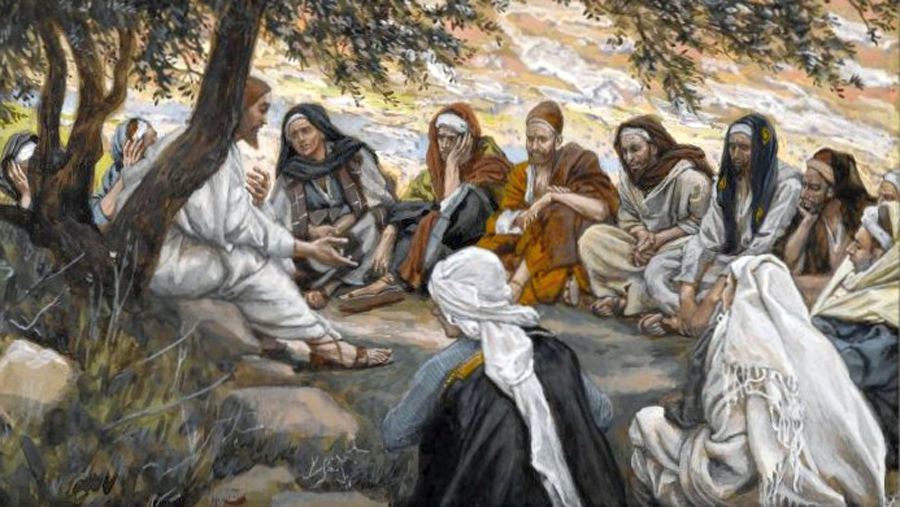
(public domain via Wikimedia Commons)
Know yourself to lead yourself
Rick Shallenberger notes a key aspect of congregational leadership.
Team-based leadership resources
This article links to helpful resources related to congregational leadership.
RCL sermons: February 12—March 12
Here are five sermons synced with the Revised Common Lectrionary (RCL) Gospel readings.
Kid’s Korner: Discipling children in a small church
Here’s a helpful strategy for ministry to children in small churches with limited resources.
If you would like to automatically receive Equipper each month by email, you may subscribe by emailing Ted.Johnston@gci.org (put “subscribe to Equipper” in the subject line).
Forgiveness: a vital relationship key
Dear Brothers and Sisters,

Wanting to give her only the best, I took Tammy to Burger King for lunch (“Be Your Way”), then to Dairy Queen for dessert (“Something Different”). You’d think I’d be embarrassed by this tacky use of corporate slogans, but as McDonalds says, “I’m Lovin’ It.” And now I must beg your forgiveness (and Tammy’s!). But kidding aside, forgiveness is a key in building and maintaining relationships that are long-lasting and life-giving. This is true in relationships between leaders and followers, husbands and wives, and parents and children—human relationships of all kinds.
Forgiveness is also a vital component in the relationship that God has with us. God, being love, has covered humanity with a blanket of forgiveness, which he has extended to us unconditionally (meaning that this forgiveness is unmerited and unearned by us). As we, by the Spirit, embrace and live into that forgiveness, we understand more and more how magnificent and glorious God’s love, exhibited in his forgiveness, truly is. In meditating on God’s love for humankind, David wrote this: “When I consider your heavens, the work of your fingers, the moon and the stars, which you have set in place, what is mankind that you are mindful of them, human beings that you care for them?” (Psalm 8:3-4). I too marvel when considering the great power and lavish generosity of God in creating and upholding our immense universe, which includes a world he knew would require the death of his Son on behalf of seemingly insignificant and certainly sinful creatures like you and me.
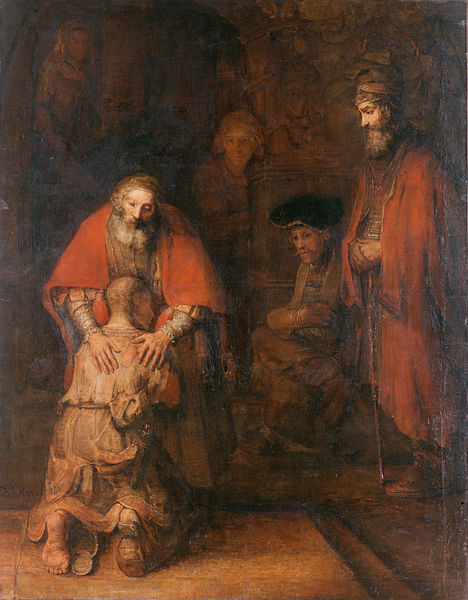
(public domain via Wikimedia Commons)
In Galatians 2:20, the apostle Paul rejoiced that Jesus Christ, in love, gave himself for us. Yet this glorious truth of the gospel often is drowned out by the “noise” of our fast-paced world. If we’re not careful, we can fail to pay attention to what Scripture says about God’s love, exhibited in his lavish forgiveness. One of the most powerful lessons about God’s forgiving love and grace in the Bible is Jesus’ Parable of the Prodigal Son. Theologian Henry Nouwen said he learned much about it by carefully studying Rembrandt’s painting, The Return of the Prodigal Son (see above), which portrays the remorse from the wayward son, the unjustified darkness of jealousy from the resentful brother, and the inescapable loving forgiveness from the father who represents God.

Another profound example of God’s forgiving love is the enacted parable recounted in the book of Hosea. Lived out through the prophet Hosea’s own experience, the parable illustrates God’s unconditional love and lavish forgiveness for wayward Israel as a powerful illustration of the forgiveness that he extends to all people.
God told Hosea to marry a prostitute named Gomer. Some believe this means he was to take a wife from the spiritually adulterous northern kingdom of Israel. In any case, it was not the kind of marriage anyone would want, as Gomer repeatedly left Hosea to have a life of prostitution. At one point Hosea buys Gomer back from presumed slave traders, yet she continued to run off with lovers who promised her material gain. “I will go after my lovers,” she said, “who give me my food and my water, my wool and my linen, my olive oil and my drink” (Hosea 2:5). Regardless of Hosea’s attempts to stop her, Gomer continued seeking companions in sin.
We cannot help but be moved by what Hosea did in taking his wayward wife back time and again—extending to her loving, unconditional forgiveness. Perhaps Gomer tried at times to make things right, but if that was the case, her repentance was short-lived. She was soon back to her adulterous ways, chasing after other lovers.
Hosea’s loving and forgiving treatment of Gomer illustrates God’s response of faithfulness to us even when we are unfaithful to him. This unconditional forgiveness is based not on how we respond, but on who God is. Like Gomer thinking she would find freedom by entering new forms of slavery, we forsake God’s love by trying to do things our own way. At one point Hosea had to pay for Gomer’s freedom with material possessions. God, who is love, paid a much higher price for our freedom—he gave his beloved Son Jesus as a “ransom for all people” (1 Timothy 2:6). God’s indestructible, never-failing, never-ending love “bears all things, believes all things, hopes all things, endures all things” (1 Cor. 13:7 NKJV). It also forgives all things, for love “keeps no record of wrongs” (1 Cor. 13:5 NIV).
Some who read Hosea’s story might contend that to keep on forgiving without repentance affirms the offender in their sin—it amounts to approving the behavior of the sinner. Others might contend that if you keep on forgiving, you will cause the offender to think they can get away with anything they want. But receiving freely-given forgiveness necessarily involves admitting that one needs that forgiveness—and that is true no matter how many times the forgiveness is extended. The one who presumes upon God’s forgiveness, using it to justify repeated offences, does not receive that forgiveness at all, for they have not acknowledged their need for forgiveness.
Presumption upon forgiveness, means rejecting rather than receiving God’s grace. Such presumption never yields a joyful, reconciled relationship with God. Nevertheless, such rejection does not cause God to withdraw his offer of forgiveness. God’s offer of forgiveness in Christ to all people is unconditioned by anything we are or anything we do.
Those who have embraced God’s unconditional forgiveness (as did the prodigal son), do not presume on that forgiveness. Knowing that they have been unconditionally forgiven, their response, rather than presumption or rejection, is one of relief and gratitude that yields a desire to reciprocate with kindness and love. When we receive forgiveness, our minds are released from the bondage that so easily builds walls between us, and we experience the freedom to grow in relationship with each other. The same is true when we unconditionally extend forgiveness to those who have offended us.
Why would we want to unconditionally forgive those who had offended us? Because that is how God, in Christ, has forgiven us. Note Paul’s statements:
Be kind and compassionate to one another, forgiving each other, just as in Christ God forgave you. (Ephesians 4:32)
As God’s chosen people, holy and dearly loved, clothe yourselves with compassion, kindness, humility, gentleness and patience. Bear with each other and forgive one another if any of you has a grievance against someone. Forgive as the Lord forgave you. And over all these virtues put on love, which binds them all together in perfect unity. (Colossians 3:12-14)
When we receive and rejoice in the unconditional forgiveness God has extended to us in Christ, we can truly value the blessing of extending life-giving, relationship-building, unconditional forgiveness to others in the name of Christ.
Rejoicing in the way forgiveness has blessed my relationships,
Joseph Tkach



